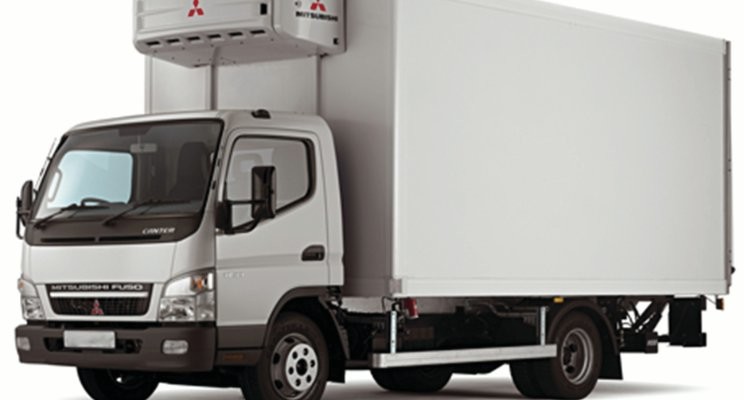Specialist Tips for Picking the most effective Refrigerated Truck Companies
Specialist Tips for Picking the most effective Refrigerated Truck Companies
Blog Article
The Relevance of Refrigerated Truck Services in Maintaining the High Quality and Quality of Temperature-Sensitive Products
Chilled vehicle solutions are essential to the logistics of temperature-sensitive products, particularly in industries such as food and pharmaceuticals, where high quality and security are paramount. By employing specific temperature level controls throughout transport, these services mitigate the risks connected with wasting and contamination, therefore guarding public health. Moreover, improvements in monitoring innovations improve functional performance and integrity. As the need for fresh and safe items remains to climb, understanding the complexities and difficulties of refrigerated transportation comes to be increasingly crucial. What implications does this have for sector criteria and consumer expectations?
Importance of Cold Chain Logistics
In the world of supply chain monitoring, the significance of chilly chain logistics can not be overemphasized. Cold chain logistics describes the specialized procedure of moving and saving temperature-sensitive items under regulated problems. This section of logistics is vital for preserving the high quality, security, and effectiveness of perishable products, specifically in industries such as drugs, food, and biotechnology.
Reliable cold chain logistics make sure that products stay within specified temperature arrays throughout the supply chain, reducing the dangers of putridity and contamination. As customers become significantly health-conscious and demand higher-quality products, firms deal with higher pressure to stick to rigorous regulative criteria. Failing to preserve an unbroken cold chain can bring about considerable monetary losses, item recalls, and damage to brand name track record.
Moreover, developments in innovation, such as real-time monitoring systems and automated temperature level controls, play a critical duty in improving cool chain performance. By buying durable cold chain logistics, firms not just make certain conformity with market regulations yet likewise foster consumer trust fund by providing top notch and risk-free items. Ultimately, the honesty of cold chain logistics is basic to the sustainability and competitiveness of organizations operating in temperature-sensitive markets.
Industries Benefiting From Refrigerated Transportation
Which industries stand to obtain the most from chilled transport? Numerous industries count heavily on temperature-controlled logistics to ensure their items keep ideal high quality and security throughout transport. The food market is the most noticeable recipient, including fresh produce, meat, dairy products, and seafood. These subject to spoiling goods need rigorous temperature level administration to prevent putridity and preserve dietary worth.
The pharmaceutical industry also considerably gain from chilled transport. Many drugs, vaccinations, and biologics are delicate to temperature fluctuations, necessitating precise cold chain logistics to make sure efficiency and safety and security. In addition, the flower sector counts on refrigerated transport to extend the shelf life of fresh blossoms throughout circulation, protecting their aesthetic appeal and fragrance.
An additional field that sees benefits is the chemical industry, specifically for items that need particular temperature conditions to keep security and prevent destruction. Also the beverage industry, consisting of alcoholic drinks and soft beverages, uses cooled transport to make certain items are supplied at the desired temperature level, improving consumer experience.

Temperature Control Mechanisms
Temperature control devices are vital for maintaining the integrity of products transferred in chilled trucks. These mechanisms make certain that the freight stays within defined temperature arrays, which is particularly crucial for perishable items such as food and drugs.
Refrigerated vehicles utilize advanced refrigeration systems, consisting of compressor-driven units and thermal insulation, to keep ideal temperatures. These systems can be categorized into 2 key kinds: cryogenic and mechanical. Mechanical systems operate utilizing refrigerants to soak up heat from inside the vehicle, while cryogenic systems utilize fluid nitrogen or co2 to achieve and keep low temperature levels.

Furthermore, the style of the vehicle's interior plays a vital function in temperature control. Proper air movement administration and tactical placement of insulation materials protect against temperature level stratification, guaranteeing consistent air conditioning throughout the cargo area. Jointly, these mechanisms are essential for protecting the high quality and quality of temperature-sensitive products throughout transportation.
Decreasing Wasting and Waste
A considerable portion of perishable products can be lost due to perishing during transportation, making the efficiency of cooled vehicle services essential for decreasing waste. These services are made to maintain ideal temperature ranges, necessary for preserving the high quality and extending the service life of temperature-sensitive products such as fruits, veggies, milk, and meats. By employing sophisticated temperature level control mechanisms, cooled vehicles ensure that products continue to be within predefined thermal thresholds throughout transportation.
The decrease of spoilage not only benefits vendors and sellers by preserving stock yet additionally contributes to environmental sustainability. Less waste generated from spoiled items suggests reduced landfill payments and reduced carbon footprints connected with disposal procedures. Efficient cooled transportation additionally advertises responsible consumption, encouraging consumers to make enlightened selections concerning the quality of their food.
Moreover, preserving item integrity throughout distribution can improve market competitiveness, as businesses that prioritize top quality are typically favored by consumers. Essentially, dependable chilled vehicle services play a pivotal function in the supply chain, dramatically lowering putridity and waste, therefore safeguarding the ecological and economic interests of stakeholders associated with the handling of subject to spoiling items.
Guaranteeing Customer Health and Security
While the conservation of subject to spoiling products is vital for lowering spoilage, it is equally important for making sure customer health and wellness and security. Chilled vehicle solutions play a crucial duty in maintaining the appropriate temperatures for temperature-sensitive products, such as fresh produce, dairy products, and meats. These items are specifically susceptible to from this source bacterial development, which can lead to foodborne illnesses if not stored and carried under regulated conditions.

In addition, adherence to this link stringent regulations and market requirements in chilled transportation promotes consumer self-confidence. transport refrigeration companies. Firms that focus on health and wellness via correct handling and storage space methods show their dedication to public well-being. Eventually, the integration of reliable cooled vehicle solutions is not just a logistical necessity; it is an essential component of protecting customer health, making certain that the food reaching our tables is risk-free, nutritious, and of the finest
Conclusion
To conclude, chilled vehicle solutions are necessary for preserving the high quality and freshness of temperature-sensitive products across numerous markets. By keeping exact temperature level controls, these solutions decrease putridity and waste, ensuring that perishable goods reach consumers in ideal problem. Additionally, the application of advanced surveillance systems enhances customer health and wellness and security, thereby enhancing public trust fund in the supply chain. The significance of cooled transportation expands beyond logistics, inevitably adding to market competition and a dedication to quality standards.
Effective cold chain logistics guarantee that products stay within specified temperature level arrays throughout the supply chain, alleviating the threats of putridity and contamination. transport refrigeration.Chilled vehicles utilize sophisticated refrigeration systems, including compressor-driven systems and thermal insulation, to preserve ideal temperatures. Mechanical systems run using cooling agents to take in warm from inside the vehicle, while cryogenic systems use liquid nitrogen or carbon dioxide to achieve and preserve reduced temperature levels
These solutions are made to preserve optimum temperature level ranges, crucial for protecting the quality and extending the shelf life of temperature-sensitive items such as fruits, veggies, dairy, and Going Here meats. Chilled truck services play a pivotal function in keeping the proper temperature levels for temperature-sensitive products, such as fresh produce, milk, and meats.
Report this page